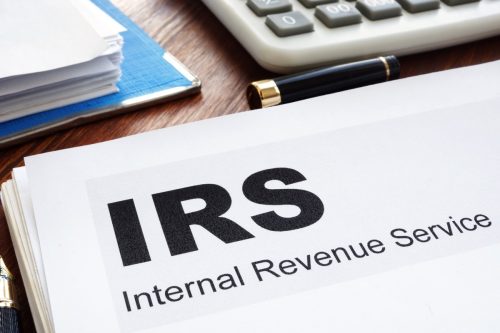The IRS Just Issued This New Warning About Your Tax Refund

Tax season can be a challenging and stressful time for any taxpayer. But for many of us, the light at the end of the tunnel is the refund we can expect to get from the Internal Revenue Service (IRS). According to the tax agency, the average payment back to taxpayers is $3,473 so far this filing season, out of the nearly 30 million tax refunds it has sent already. But getting money back from the IRS this year might not be such an easy feat for everyone. The tax agency just issued a new warning about refunds, detailing a large problem it is currently facing and how it plans to address it. Read on to find out what the IRS said you should expect when it comes to your tax refund.
RELATED: The IRS Now Won’t Let You Do This Until After April 18.
The IRS is dealing with a larger backlog of returns and refunds than ever before.

On March 10, the U.S. Department of the Treasury reported that the IRS is facing a huge problem with refunds. When entering a normal filing year, the tax agency usually has under one million returns and refunds still unprocessed from the year prior. This year, the IRS entered the filing season with a backlog over 15 times larger than that.
“Since the pandemic began, IRS employees have been called on to go above and beyond for the American people, and they have met the moment. But they’ve had to do so without adequate resources and funding, which is why the agency faces the challenges that it does today. The Biden Administration is committed to getting the IRS the stable, long-term funding it needs to be able to serve the American people,” Wally Adeyemo, deputy secretary of the Treasury, said in a statement.
While the IRS has said most refunds should still be issued within 21 days, experts say more delayed refunds are likely, CNBC reports.
The IRS is facing one of the most difficult filing seasons in history.

Due to its extensive backlog, the IRS is dealing with one of the most challenging tax filing seasons in history. According to the Treasury Department, the challenge with processing refunds stems from two different factors: funding issues and challenges brought on by the COVID pandemic.
The tax agency’s budget has been cut by nearly 20 percent since 2010 and its workforce is the same size it was in 1970 as a result. At the same time, the U.S. population has grown by 60 percent. “In the first half of 2021, fewer than 15,000 workers handled nearly 200 million calls received, which translates to one person for every 13,000 calls,” the Treasury Department explained. “Today’s historically low level of funding means that the IRS isn’t equipped to provide the American people the service they deserve.”
In terms of the COVID pandemic, the IRS has also been called to support emergency relief for taxpayers, like with the three rounds of stimulus checks it sent out to 85 percent of U.S. households. “Including individual refunds, the IRS has distributed over $1.5 trillion to Americans since the pandemic began. This was all done at a time when the IRS budget was at historic lows, and while adjusting operating protocols to ensure the IRS workforce was safe and healthy in the midst of the pandemic,” the department said.
RELATED: For more financial advice delivered straight to your inbox, sign up for our daily newsletter.
The IRS has announced a new program to deal with delayed refunds

The IRS is working with the Treasury Department to combat this challenge. According to the department, the tax agency is laying out an “all-hands-on-deck” approach to battling its already delayed refunds and returns while also trying to prevent further refund issues.
“IRS employees have been working tirelessly to process backlogged returns and taxpayer correspondence. To ensure inventory is back to a healthy level for next filing season, we are leaving no stone unturned—taking an all-hands-on-deck approach to ensure as many employees as possible are dedicating time to return processing,” IRS Commissioner Charles Rettig said in a statement. “This includes bringing on new employees and reassigning current IRS employees to process inventory.”
The new initiative targets three key areas for the tax agency.

The “all-hands-on-deck” initiative is set to hit three different areas for the IRS: hiring more employees, increasing taxpayer assistance, and deploying updated technology services. In terms of employees, the tax agency is looking to hire 10,000 new employees from job fairs held across the country, as well as creating a new 700-person surge team strictly meant to process new returns. At the same time, the IRS is also requiring mandatory, paid overtime for more than 6,000 employees and pursuing additional contracting options for mailroom operations, transcription, and paper return input.
The IRS says it will also be communicating directly with taxpayers to ensure accurate returns, as a “large share of the backlog stems from small errors by millions of taxpayers on their tax returns,” the department said. This increased taxpayer assistance includes sending taxpayers more letters to prevent processing delays, providing increased online and in-person help, and expanding customer callback for phone help.
On top of that, the IRS has developed an automated tool to correct return errors this filing season, which originally required a manual review by an IRS processing employee. It has also suspended dozens of notices that are being incorrectly sent to taxpayers because of its large backlog, as well as developed new automated support technology for taxpayers.